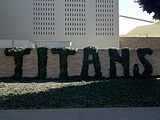Related Research Articles
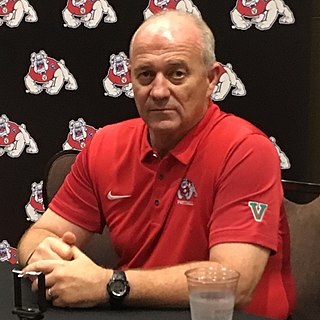
Jeffrey Raye Tedford is an American football coach and former player who is currently serving as the head coach at Fresno State, a position he also held from 2017 to 2019. From 2002 to 2012, Tedford was the head football coach at California, where he was twice named Pac-10 Coach of the Year and holds the California program records for most wins, games coached, and bowl game victories.

Michael A. Pringle is an American former professional football player who was a running back in the Canadian Football League (CFL). He set or tied almost every significant league record for the position. He played college football for the Cal State Fullerton Titans, earning third-team All-American honors. He was twice signed by National Football League (NFL) teams, though he saw very limited playing time.
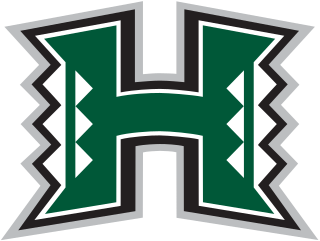
The Hawaii Rainbow Warriors football team represents the University of Hawaiʻi at Mānoa in NCAA Division I FBS college football. It was part of the Western Athletic Conference until July 2012, when the team joined the Mountain West Conference.
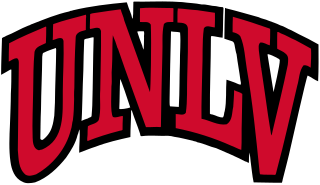
The UNLV Rebels football program is a college football team that represents the University of Nevada, Las Vegas (UNLV). The team is a member of the Mountain West Conference, which is a Division I Bowl Subdivision conference of the National Collegiate Athletics Association (NCAA). The program, which began on September 14, 1968, plays its home games at Allegiant Stadium in Paradise, Nevada.
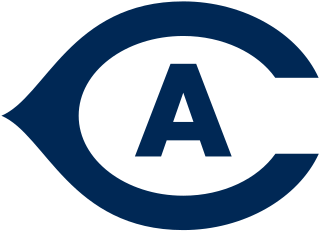
The UC Davis Aggies football team represents the University of California, Davis in NCAA Division I Football Championship Subdivision (FCS). The football program's first season took place in 1915, and has fielded a team each year since with the exception of 1918 during World War I and from 1943 to 1945 during World War II, when the campus, then known as the University Farm, was shut down. The team was known as the Cal Aggies or California Aggies from 1922 to 1958 when UC Davis was called the Northern Branch of the College of Agriculture.
The Long Beach State 49ers football team represented California State University, Long Beach from the 1955 through 1991 seasons. The 49ers originally competed as an Independent before joining the California Collegiate Athletic Association in 1958. By the 1969 season, the 49ers joined the Pacific Coast Athletic Association as a founding member, where they remained until the program was suspended following the 1991 season.

The Cal Poly Mustangs are the football team representing California Polytechnic State University located in San Luis Obispo, California.

The Cal State Fullerton Titans are the athletic teams that represent California State University, Fullerton.

The Cal State Fullerton Titans baseball team represents California State University, Fullerton in NCAA Division I college baseball.

The Towson Tigers football team represents Towson University in the sport of American football. The Tigers compete in the NCAA Division I Football Championship Subdivision (FCS) as a member of the Colonial Athletic Association (CAA). The Tigers are currently coached by Pete Shinnick. Their home games are played at Johnny Unitas Stadium in Towson, Maryland.
The Humboldt State Lumberjacks football program represented Humboldt State University, known since January 2022 as California State Polytechnic University, Humboldt, in college football and played its home games at the Redwood Bowl in Arcata, California. Humboldt State was a football member of the Great Northwest Athletic Conference in NCAA Division II. Through the 2017 season, the Lumberjacks played 89 seasons and had an all-time record of 402–395–21 (.504).
The 1983 California Bowl was an American college football bowl game played on December 17, 1983 at Bulldog Stadium in Fresno, CA. The game pitted the Northern Illinois Huskies and the Cal State Fullerton Titans.
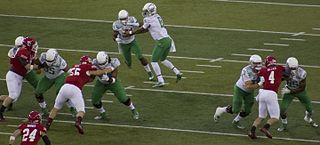
The 2014 NCAA Division I FBS football season was the highest level of college football competition in the United States organized by the National Collegiate Athletic Association (NCAA).
The 1975 Cal State Fullerton Titans football team represented California State University, Fullerton as a member of the Pacific Coast Athletic Association (PCAA) during the 1975 NCAA Division I football season. Led by first-year head coach Jim Colletto, Cal State Fullerton compiled an overall record 2–9 with a mark of 0–5 in conference play, placing last out of six teams in the PCAA. The Titans played home games at Santa Ana Stadium in Santa Ana, California.
The 1977 Cal State Fullerton Titans football team represented California State University, Fullerton as a member of the Pacific Coast Athletic Association (PCAA) during the 1977 NCAA Division I football season. Led by third-year head coach Jim Colletto, Cal State Fullerton compiled an overall record 4–7 with a mark of 0–4 in conference play, placing last out of five teams in the PCAA. The Titans played home games at Falcon Stadium on the campus of Cerritos College in Norwalk, California.
The 1971 Cal State Fullerton Titans football team represented California State College at Fullerton—now known as California State University, Fullerton—as a member of the California Collegiate Athletic Association (CCAA) during the 1971 NCAA College Division football season. Led by Dick Coury in his second and final season as head coach, Cal State Fullerton compiled an overall record of 7–4 with a mark of 3–1 in conference play, placing second in the CCAA. At the end of the season, the Titans took part in the second Mercy Bowl, a benefit for the families of three Cal State Fullerton assistant coaches who had perished in a plane crash a month earlier. Cal State Fullerton played home games at three different sites: four games Anaheim Stadium in Anaheim, California, one at Santa Ana Stadium in Santa Ana, California, and one at the Los Angeles Memorial Coliseum in Los Angeles.
The 1979 Cal State Fullerton Titans football team represented California State University, Fullerton as a member of the Pacific Coast Athletic Association (PCAA) during the 1979 NCAA Division I-A football season. Led by Jim Colletto in his fifth and final season as head coach, Cal State Fullerton finished the season with an overall record of 3–8 and a mark of 1–4 in conference play, placing fifth in the PCAA. The Titans played home games at Falcon Stadium on the campus of Cerritos College in Norwalk, California.
The 1983 Cal State Fullerton Titans football team represented California State University, Fullerton as a member of the Pacific Coast Athletic Association (PCAA) during the 1983 NCAA Division I-A football season. Led by fourth-year head coach Gene Murphy, Cal State Fullerton finished the season with an overall record of 7–5 and a mark of 5–1 in conference play, winning the PCAA title. As conference champion, the Titans were invited to play in the California Bowl in Fresno, California against the champion of the Mid-American Conference (MAC), Northern Illinois. Cal State Fullerton won the game, 20–13.
The 1984 Cal State Fullerton Titans football team represented California State University, Fullerton as a member of the Pacific Coast Athletic Association (PCAA) during the 1984 NCAA Division I-A football season. Led by fifth-year head coach Gene Murphy, Cal State Fullerton finished the season with an overall record of 11–1 and a mark of 6–1 in conference play, placing second in the PCAA behind UNLV, who dealt the Titans their only defeat of the season. Cal State Fullerton played its home games at Santa Ana Stadium in Santa Ana, California. This was the fourth home venue for the Titans in three years, but they continued playing in Santa Ana Stadium for the next eight season.

Glover Stadium/Dee Fee Field is a stadium in Anaheim, California located in La Palma Park. It is a combined multi-purpose stadium primarily used for baseball and football in addition to soccer. The seating capacity for baseball is 700 and 5,200 for football and soccer.
References
- ↑ "University Colors | CSUF Brand" . Retrieved December 5, 2022.
- 1 2 3 4 5 6 7 8 9 10 Carr, Janis (December 8, 1992). "CS Fullerton drops football – Program scheduled for reinstatement in 1994 at lower level, smaller budget". The Orange County Register. Retrieved June 22, 2019– via NewsBank.
- 1 2 3 Cal St.-Fullerton Yearly Totals Archived 2008-07-06 at the Wayback Machine College Football Data Warehouse, cfbdatawarehouse.com. Accessed December 9, 2008.
- ↑ Miller, Scott (April 28, 1993). "Titan Coaches Trying to Stop Football Plans". Los Angeles Times. Retrieved June 22, 2019.
- ↑ Turner, Miki (February 23, 1994). "Football won't make comeback this fall". The Orange County Register. p. D2. Retrieved June 22, 2019– via NewsBank.
- ↑ Carr, Janis (November 16, 1995). "Movement to resurrect Titans football gaining steam". The Orange County Register– via NewsBank.
- ↑ Aird, Donovan (June 5, 2008). "How the West was undone". Mustang Daily. p. 14. Retrieved March 11, 2023.
- ↑ Fader, Mirin (November 11, 2013). "A game plan to bring back Titan football". The Orange County Register. Archived from the original on May 17, 2014. Retrieved June 22, 2019.
- ↑ Fisher, Marla Jo (February 6, 2009). "Could football come back to Cal State Fullerton?". The Orange County Register. Archived from the original on February 10, 2009. Retrieved June 22, 2019.
- ↑ Fumbles "Football Bowl Subdivision (FBS) Records," NCAA, July 2008. p. 27. Accessed 2008-12-11
- ↑ Kickoff Returns "Football Bowl Subdivision (FBS) Records," NCAA, July 2008. p. 27. Accessed 2008-12-11
- ↑ Rushing – Single Game Yards "Football Bowl Subdivision (FBS) Records," NCAA, July 2008. p. 34. Accessed 2008-12-11
- ↑ Highest-Scoring Tie Games "Football Bowl Subdivision (FBS) Records," NCAA, July 2008. p. 128. Accessed 2008-12-11
- ↑ "NFL Players who attended California State University, Fullerton". databasefootball.com. Archived from the original on 2008-03-07. Retrieved 2008-12-10.
- ↑ "Regular Season All-Time Records: Individual Records -Rushing". CFL.ca. Archived from the original on 2015-01-04. Retrieved 2008-12-10.
- ↑ "Regular Season All-Time Records: Individual Records – Passing". CFL.ca. Archived from the original on 2008-10-16. Retrieved 2008-12-10.
- ↑ "Regular Season All-Time Records: Individual Records – Receiving". CFL.ca. Archived from the original on 2009-02-27. Retrieved 2008-12-10.
